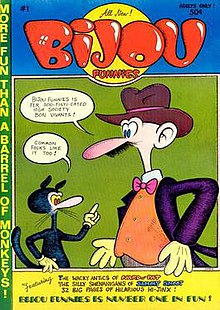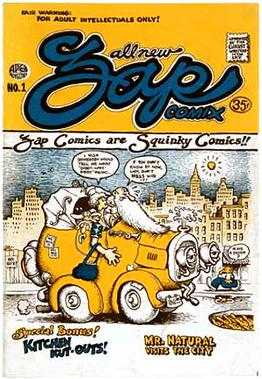
Underground comix are small press or self-published comic books that are often socially relevant or satirical in nature. They differ from mainstream comics in depicting content forbidden to mainstream publications by the Comics Code Authority, including explicit drug use, sexuality, and violence. They were most popular in the United States in the late 1960s and 1970s, and in the United Kingdom in the 1970s.
The Print Mint, Inc. was a major publisher and distributor of underground comix based in the San Francisco Bay Area during the genre's late 1960s-early 1970s heyday. Starting as a retailer of psychedelic posters, the Print Mint soon evolved into a publisher, printer, and distributor. It was "ground zero" for the psychedelic poster. The Print Mint was originally owned by poet Don Schenker and his wife Alice, who later partnered in the business with Bob and Peggy Rita.

Kitchen Sink Press was a comic book publishing company founded by Denis Kitchen in 1970. Kitchen Sink Press was a pioneering publisher of underground comics, and was also responsible for numerous republications of classic comic strips in hardcover and softcover volumes. One of their best-known products was the first full reprint of Will Eisner's The Spirit—first in magazine format, then in standard comic book format. The company closed in 1999.

Jay Patrick Lynch was an American cartoonist who played a key role in the underground comix movement with his Bijou Funnies and other titles. He is best known for his comic strip Nard n' Pat and the running gag Um tut sut. His work is sometimes signed Jayzey Lynch. Lynch was the main writer for Bazooka Joe comics from 1967 to 1990; he contributed to Mad, and in the 2000s expanded into the children's book field.
Jay Kinney is an American author, editor, and former underground cartoonist. Kinney has been noted for "adding new dimensions to the political comic" in the underground comix press of the 1970s and '80s.
Rory Hayes was an American underground cartoonist in the late 1960s and early 1970s. His comics were drawn in an expressionistic, primitivist style and usually dealt with grim subject matter such as paranoia, violent crime, and drug abuse. In addition to his own titles, Bogeyman and Cunt Comics, he was published in many of the most prominent comics in the underground scene, including Bijou Funnies and Arcade.
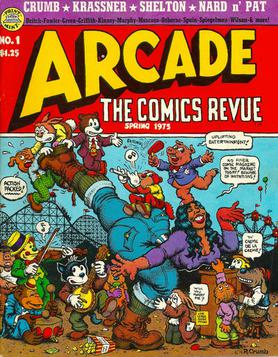
Arcade: The Comics Revue is a magazine-sized comics anthology created and edited by cartoonists Art Spiegelman and Bill Griffith to showcase underground comix. Published quarterly by the Print Mint, it ran for seven issues between 1975 and 1976. Arriving late in the underground era, Arcade "was conceived as a 'comics magazine for adults' that would showcase the 'best of the old and the best of the new comics'". Many observers credit it with paving the way for the Spiegelman-edited anthology Raw, the flagship publication of the 1980s alternative comics movement.

Diane Robin Noomin was an American comics artist associated with the underground comics movement. She is best known for her character DiDi Glitz, who addresses transgressive social issues such as feminism, female masturbation, body image, and miscarriages.
Mervyn "Skip" Williamson was an American underground cartoonist and central figure in the underground comix movement. Williamson's art was published in the National Lampoon, High Times, the Realist, the Industrial Worker, the Chicago Seed, Encyclopædia Britannica and others. His best-known character is Snappy Sammy Smoot.
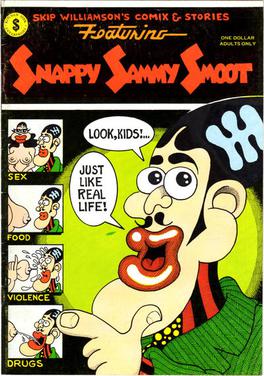
Snappy Sammy Smoot is an American underground comix character created by Skip Williamson in 1968. A counterculture Candide who never loses his innocence, Snappy Sammy Smoot appeared in his own strips in a number of comix titles, most notably Bijou Funnies, Comix Book, and Blab!. Cultural critic David Manning White wrote about the strip, "But what is. .. interesting about 'Snappy Sammy Smoot' is that it manages to be politically radical at the same time it is satirical and funny", and that it is "one of more highly stylized in the field".

Donald Richard Donahue was a comic book publisher, operating under the name Apex Novelties, one of the instigators of the underground comix movement in the 1960s.
Gary Edson Arlington was an American retailer, artist, editor, and publisher, who became a key figure in the underground comix movement of the 1960s and 1970s. As owner of one of America's first comic book stores, the San Francisco Comic Book Company, located in San Francisco's Mission District, Arlington's establishment became a focal point for the Bay Area's underground artists. He published comics under the name San Francisco Comic Book Company, as well as publishing and distributing comics under the name Eric Fromm. Cartoonist Robert Crumb has noted, "Gary made a cultural contribution in San Francisco in the late 1960s, through the '70s, '80s & '90s that was more significant than he realizes."

Young Lust was an underground comix anthology published sporadically from 1970 to 1993. The title, which parodied 1950s romance comics such as Young Love, was noted for its explicit depictions of sex. Unlike many other sex-fueled underground comix, Young Lust was generally not perceived as misogynistic. Founding editors Bill Griffith and Jay Kinney gradually morphed the title into a satire of societal mores. According to Kinney, Young Lust "became one of the top three best-selling underground comix, along with Zap Comix and The Fabulous Furry Freak Brothers".

Company & Sons was an early underground comix publisher based in San Francisco, ran by John Bagley. The company operated from 1970 to 1973, publishing a total of 15 titles, all but one of them consisting of a single issue.
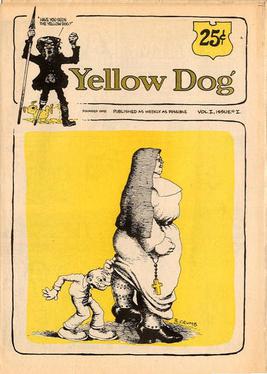
Yellow Dog was an underground comix newspaper and later comic book published by the Print Mint in Berkeley, California. It published 22 issues from 1968 to 1973, featuring many of the period's most notable underground cartoonists, including Robert Crumb, Joel Beck, Robert Williams, Rick Griffin, Greg Irons, and Trina Robbins. Other frequent contributors included Andy Martin, Franz Cilensek, John Thompson, Buckwheat Florida, Jr., Jim Osborne, Ronald Lipking, and Hak Vogrin. The founding editor was Print Mint co-publisher Don Schencker.

San Francisco Comic Book was an underground comix anthology published between 1970 and 1983. Conceived of and edited by Gary Arlington, the anthology highlighted the work of many of San Francisco's top underground talents, including Bill Griffith, Robert Crumb, Kim Deitch, Justin Green, Rory Hayes, Willy Murphy, Jim Osborne, Trina Robbins, and Spain Rodriguez.
William "Willy" Murphy was an American underground cartoonist and editor. Murphy's humor focused on hippies and the counterculture. His signature character was Arnold Peck the Human Wreck, "a mid-30s beanpole with wry observations about his own life and the community around him." Murphy's solo title was called Flamed-Out Funnies; in addition, he contributed to such seminal underground anthologies as Arcade, Bijou Funnies, and San Francisco Comic Book, as well as the National Lampoon.

Cartoonists Co-op Press was an underground comix publishing cooperative based in San Francisco that operated from 1973 to 1974. It was a self-publishing venture by cartoonists Kim Deitch, Bill Griffith, Jerry Lane, Jay Lynch, Willy Murphy, Diane Noomin, and Art Spiegelman. Cartoonist Justin Green's brother Keith acted as salesman/distributor, and the operation was run out of Griffith's apartment.
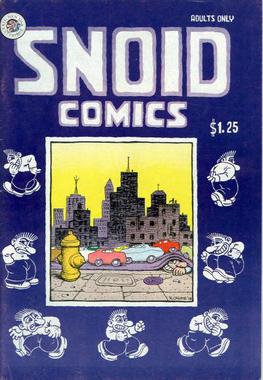
The Snoid, occasionally referred to as Mr. Snoid, is an American underground comix character created by Robert Crumb in the mid-1960s. A diminutive sex fiend and irritating presence, the Snoid often appears with other Crumb characters, particularly Angelfood McSpade, Mr. Natural, and Crumb's own self-caricature.
ProJunior, sometimes styled as Pro Junior, is an American comics character created by Don Dohler in 1958. He debuted in a fanzine in 1961, and in underground comix in 1970. Known as "Baltimore's blasphemous bad boy", the character is unusual in the underground genre for being "shared" by a number of different creators, appearing in stories by Jay Lynch, Art Spiegelman, Skip Williamson, and Robert Crumb. His main period of popularity was from 1970 to 1972.
